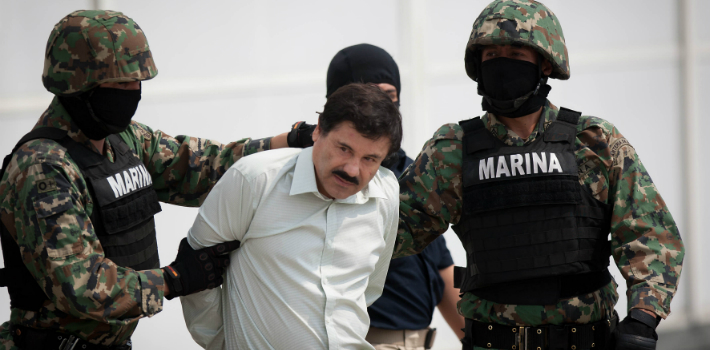
EspañolThe great escape of Sinaloa Cartel leader Joaquín Guzmán Loera, better known as “El Chapo,” has reinforced the myth surrounding the drug kingpin and his history. But Mexico is not the only country concerned over the jailbreak. The presidents of the neighboring Northern Triangle (El Salvador, Guatemala, and Honduras) are scrambling to figure out how El Chapo’s potential return to business might affect the regional drug-war strategy.
Over the last few years, as the Northern Triangle became an increasingly important corridor for drug shipments en route to the United States, El Chapo’s cartel has left a trail of death and corruption that has weakened the political institutions of Honduras, El Salvador, and Guatemala.
Nicaragua is also part of this corridor, but it has been excluded from the regional strategy due to the government’s political alliance with countries such as Venezuela, China, and Russia.
The US government increased monetary aid in the region to help dismantle drug-trafficking organizations after Vice President Joe Biden suggested a Plan-Colombia style strategy for Central America.
So far, the roll out for the Northern Triangle’s Alliance for Prosperity has gone smoothly, despite the usual set of critics and naysayers. The plan, however, did not account for the reemergence of a capo like El Chapo Guzmán, the likes of which has not been seen since the days of the late Pablo Escobar.
Guzmán had turned northwestern Honduras into his trade and entertainment hub. Whole towns were under the spell of the lavish underground economy, which was diminished after Mexican authorities captured the kingpin. As other regional drug traffickers fell, the effect on the local economy was notable.
Guatemala and El Salvador are also facing drug-war related consequences. The former has witnessed how corruption networks infiltrated the top political class, sparking very peculiar demonstrations. Meanwhile, El Salvador has experienced a surge in violence as gangs rake in extortion and drug-trafficking money.
In fact, El Salvador faces the worst conditions in the region in terms of fighting crime and the government hoped the resources coming from the Alliance for Prosperity plan would boost security forces.
El Chapo’s prison break threw all those prospects into question. The Sinaloa Cartel is a criminal organization that has turned Central America upside down, comparable only to the legendary Medellín Cartel led by Escobar. However, advancements in communication technology could help the Sinaloa Cartel surpass Escobar’s accomplishments.
Are Central American countries prepared to counter an even stronger Sinaloa Cartel? Guzmán’s arrest was said to have diminished the kingpin’s pull within the organization, but the intricate escape from a maximum-security prison has left little doubt that El Chapo still has sway. He was able to arrange the logistics, bribes, and everything else necessary to get back on the streets and back to business.
His return will surely affect the national security and politics of the Northern Triangle and Mexico, which is already in turmoil, as the cartel continues to attempt to infiltrate and destabilize governments that oppose it.
Governments, however, will not bear the brunt of the damage. As always, ordinary citizens will face the worst of it. Although some refuse to believe it, 80 percent of all “public insecurity” incidents are tried to drug-related crime.
To avoid the same cycle from repeating again, we must reconsider the US-led strategy in the region to fight the drug war. From Colombia in the 1990s, to Central America and Mexico in the 2000s, the strategy has never provided positive results. On the contrary, it has sparked massive corruption, violence, and death.
Isn’t it time to come up with new strategies? Haven’t we been through enough already to not realize that no “war” leads to peace?
Yes, peace comes through justice, and it must be sought. However, we can’t only go after short-term goals. Justice must not only be delivered to the current victims of drug violence but also to the coming generations who deserve to live in societies with realistic and effective policies.
The Northern Triangle faces an enormous challenge now that El Chapo is back. The Alliance for Prosperity will need to pass a litmus test and the region’s governments will have to close ranks and counter any attack from criminal groups attempting to jeopardize their stability. When push comes to shove, state-security forces are the only ones capable of doing the job.
 Versión Español
Versión Español












